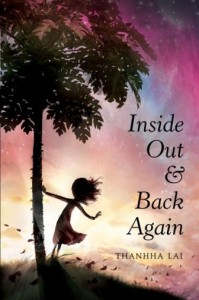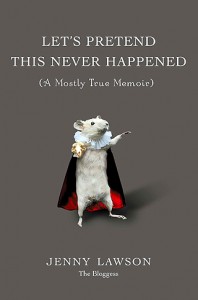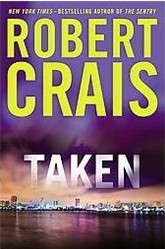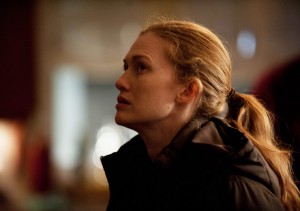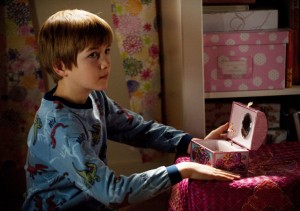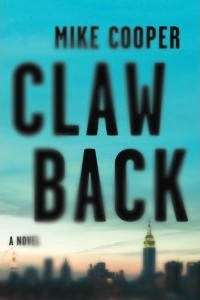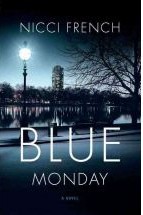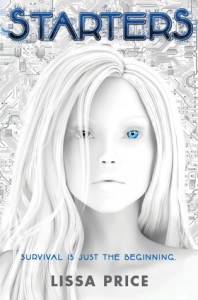Life’s been so busy, I haven’t had a chance to blog in about a week, a fact that probably only three of you noticed. But I managed to finish my work on time last Friday to take in a screening of The Hunger Games, which made $155 mil at the box office this past weekend. I’ve never read any of the books by Suzanne Collins because the idea of adults manipulating children into killing each other for sport is horrific to me. I can’t even watch gladiator movies, and still remember how much William Golding’s Lord of the Flies and Richard Connell’s short story “The Most Dangerous Game” shocked me when I read them as a teen.
**Spoilers**
 But Mr. PCN wanted to see the movie, having devoured the books, so off we went. I was stunned by the violence, despite the PG-13 treatment, but I was also greatly moved. Rue’s death had me sobbing into my snack tray. It left me wanting to discuss it afterward, so I asked two other people—my regular contributor, Eric Edwards; and my YA reviewer/10-year-old niece, Mena Dolinh—to participate in a Q&A.
But Mr. PCN wanted to see the movie, having devoured the books, so off we went. I was stunned by the violence, despite the PG-13 treatment, but I was also greatly moved. Rue’s death had me sobbing into my snack tray. It left me wanting to discuss it afterward, so I asked two other people—my regular contributor, Eric Edwards; and my YA reviewer/10-year-old niece, Mena Dolinh—to participate in a Q&A.
We’d come at it from three different POVs: me as the adult approaching the movie cold, Eric as the adult who’s familiar with the novels, and Mena representing the books’ first and most ardent fans—the tweens and tribute-aged kids.
Pop Culture Nerd: How did the movie compare to the book?
Mena Dolinh: I thought it was good and covered all the main parts of the book, but sometimes I wished they would go into more detail on something, like how Katniss hated Prim’s cat, Buttercup. I suppose it they included every detail the movie would be really long.
I really liked how they added the Gamemakers controlling the arena so you could see how they could manipulate all the tributes and see the game really coming together. In the book, you could only see everything from Katniss’s perspective. I thought that the changes in the movie were necessary because if the whole movie was completely the same as the book then it just wouldn’t be very exciting at all.
Eric Edwards: I was surprised by how bleak the movie was. I figured the filmmakers would make it less disturbing than the text. Even the editing for the film was lean and cold. The movie gives you only hints of exposition instead of drawing it out in the beginning so in that sense, it sticks to the tone of the book.
PCN: One of the reasons I resisted reading these books is because the subject matter is so disturbing. I’m a wuss when it comes to kids and violence. What drew you to the stories, and why do you think they’re so popular?
MD: My older sister got the books for her birthday and was engrossed in them so I was curious. I like the characters and read all three books to find out what happened to them. The first one is the best. By the end of Mockingjay, the story was more focused on the rebellion than the characters and it went on too long. I can’t speak for my friends or why other people like the books.
EE: The book is unapologetic in the way it shows us Katniss’s world and life amongst the populace of District 12 versus the residents of Capitol City. What kept me reading was the lean prose. There isn’t a lot of frou-frou, which makes it a page-turner.
 PCN: I thought Jennifer Lawrence did a remarkable job, so strong and steady, and with excellent archery technique. I also enjoyed Woody Harrelson’s performance as Haymitch. The Capitol costumes were dazzling and fun. Did the look of the movie come close to how you imagined everything? Was anything just wrong or done better in the movie?
PCN: I thought Jennifer Lawrence did a remarkable job, so strong and steady, and with excellent archery technique. I also enjoyed Woody Harrelson’s performance as Haymitch. The Capitol costumes were dazzling and fun. Did the look of the movie come close to how you imagined everything? Was anything just wrong or done better in the movie?
MD: Most of the things in the movie were pretty close to what I imagined. The only thing I was expecting was a big golden Cornucopia instead of a black one. Some of the fight scenes were a little too rushed and I couldn’t really tell what was going on. I was really impressed with the casting. I really liked the costumes because the Capitol is supposed to have all these outrageous costumes but they weren’t too exaggerated.
There weren’t any parts that were just completely wrong but I thought Effie and Haymitch could have been included in more scenes. In the books, they were the main characters who actually trained Katniss and Peeta and guided them, but in the movie, the only times you saw them was at dinner or when they were giving the tributes [survival] tips.
 I really liked Seneca Crane’s beard because it looked like someone just said, “Hey, this guy looks too normal. Let’s use a stencil to make his beard look weird.” I found out his beard has its own Facebook page!
I really liked Seneca Crane’s beard because it looked like someone just said, “Hey, this guy looks too normal. Let’s use a stencil to make his beard look weird.” I found out his beard has its own Facebook page!
EE: District 12 and the Capitol were as described in the book, but Katniss’s community was bleaker and more squalid than I had imagined, and the Capitol even more plastic and fake.
 Also, in the book, the view of what happens within the games is more from Katniss’s point of view. We never get to see the gleeful attitude the Gamemakers have in the creation/manipulation of the obstacles and contestants. It was strange to see how proud they were of the mutts they created. In the book, those beasts were contestants who had been killed already, then genetically altered into a kind of wolf-human hybrid. Kinda like werewolves, I guess.
Also, in the book, the view of what happens within the games is more from Katniss’s point of view. We never get to see the gleeful attitude the Gamemakers have in the creation/manipulation of the obstacles and contestants. It was strange to see how proud they were of the mutts they created. In the book, those beasts were contestants who had been killed already, then genetically altered into a kind of wolf-human hybrid. Kinda like werewolves, I guess.
PCN: Was there anything left out from the book that you missed seeing?
 MD: I wished they had included the avoxes in the movie. In the beginning when the hovercraft was passing through, I expected the avox girl to get caught then so when Katniss goes to the Capitol, she would recognize her. I also wished they had included Peeta losing his leg while fighting the mutts because it affected him throughout the whole trilogy. When the movie ended, I expected to see Katniss and Peeta in the hovercraft having their cuts or injuries being tended to, but you don’t see that at all.
MD: I wished they had included the avoxes in the movie. In the beginning when the hovercraft was passing through, I expected the avox girl to get caught then so when Katniss goes to the Capitol, she would recognize her. I also wished they had included Peeta losing his leg while fighting the mutts because it affected him throughout the whole trilogy. When the movie ended, I expected to see Katniss and Peeta in the hovercraft having their cuts or injuries being tended to, but you don’t see that at all.
EE: The ships that hovered over the dead contestants and spirited them somewhere else. The three-fingered salute was never explained in the movie. And I know this is going to sound silly, but I miss Madge.
PCN: I was so tense during the whole movie, watching through my fingers at times. Did it manage to be suspenseful or surprising for you?
 MD: Yes, because even though I knew what would happen, I didn’t know when or how. Like the mutts scene in the jungle. I knew it was coming but when the mutts just appeared, I was really startled. And you also see the movie from a different perspective than [Katniss’s] in the book, so when the Gamemakers started a fire or placed an animal into the arena, I was still wondering, “What is Katniss going to do?” I thought the reaping was suspenseful because even though I knew that Katniss would volunteer in her sister’s place, I didn’t know what her reaction was going to be at the moment she decided to make that sacrifice.
MD: Yes, because even though I knew what would happen, I didn’t know when or how. Like the mutts scene in the jungle. I knew it was coming but when the mutts just appeared, I was really startled. And you also see the movie from a different perspective than [Katniss’s] in the book, so when the Gamemakers started a fire or placed an animal into the arena, I was still wondering, “What is Katniss going to do?” I thought the reaping was suspenseful because even though I knew that Katniss would volunteer in her sister’s place, I didn’t know what her reaction was going to be at the moment she decided to make that sacrifice.
EE: Seeing it reimagined on the big screen made it more intense overall. I didn’t expect the movie to have that effect on me.
PCN: For people who have only seen the movie, would you recommend we go back and read the book? Or should we just read the second and third books since we already know what happened in the first? I actually want to read them now, which is weird because I didn’t originally. And I usually read books before the movie adaptations.
MD: I think you should read them all because the last two books make references to things that happened in the first one. You should read all the parts that weren’t included in the movie. It could also help you picture things differently and you can compare them.
EE: A resounding YES for me.
Thanks, Eric and Mena, for chatting with me!
What did you all think of the movie?
Photos: Murray Close/Lionsgate
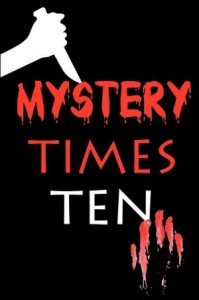 Couple of things I want to mention today. First, Mystery Times Ten 2011, the YA anthology that published my short story last year, is free for the Kindle today, April 12, only. Click here if you’re interested in
Couple of things I want to mention today. First, Mystery Times Ten 2011, the YA anthology that published my short story last year, is free for the Kindle today, April 12, only. Click here if you’re interested in  The other bit of news is that I entered the Independent Book Blogger Awards competition happening over at Goodreads. The prizes are four free trips to Book Expo of America in NYC in June, one for each blogger in four different categories: adult fiction, adult nonfiction, YA & children’s, and publishing. There are hundreds of quality bloggers entered so my chances of winning are about equal to those of my teenage self being crowned prom queen (I wasn’t even asked to the prom). But Mr. PCN knew I’ve long wanted to go to BEA so he locked me in the den on the last day entries were accepted and said I couldn’t come out for dinner until I had submitted my blog. Imagine him saying, “No soup for you!” in that Soup Nazi voice. I love soup so I had no choice but to do as instructed.
The other bit of news is that I entered the Independent Book Blogger Awards competition happening over at Goodreads. The prizes are four free trips to Book Expo of America in NYC in June, one for each blogger in four different categories: adult fiction, adult nonfiction, YA & children’s, and publishing. There are hundreds of quality bloggers entered so my chances of winning are about equal to those of my teenage self being crowned prom queen (I wasn’t even asked to the prom). But Mr. PCN knew I’ve long wanted to go to BEA so he locked me in the den on the last day entries were accepted and said I couldn’t come out for dinner until I had submitted my blog. Imagine him saying, “No soup for you!” in that Soup Nazi voice. I love soup so I had no choice but to do as instructed.
